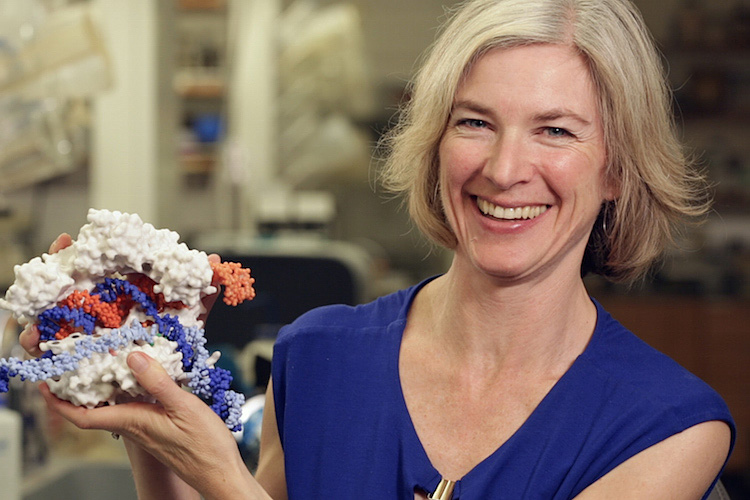UC receives patent for use of CRISPR-Cas9 to tune gene expression
UC's fifth patent for CRISPR-Cas9, along with five more to come soon from the U.S. patent office, expands the toolkit for gene editing
May 28, 2019
The U.S. Patent and Trademark Office today issued a patent to the University of California (UC), the University of Vienna and French biologist Emmanuelle Charpentier that covers methods of modulating DNA transcription using the CRISPR-Cas9 system.

Jennifer Doudna holds a model of the CRISPR-Cas9 protein (white) interacting with DNA (orange and blue).
The patent (No. 10,301,651) covers techniques that enable sequence-specific repression or activation of gene expression in all types of cells, including both prokaryotic (bacteria) and eukaryotic (plant and animal) cells. These unique methods form a toolset for controlling gene expression that effectively enables genes to be turned up or down.
“Today’s patent further builds on the numerous CRISPR-Cas9 techniques covered by UC’s patents, and the university is committed to ensuring the technology is used to benefit society,” said Eldora L. Ellison, the lead patent strategist on CRISPR-Cas9 matters for UC and a director at Sterne, Kessler, Goldstein & Fox. “We anticipate that UC’s robust portfolio of intellectual property surrounding its CRISPR-Cas9 inventions will continue to expand.”
Today’s patent is the fifth in UC’s swiftly growing CRISPR-Cas9 patent portfolio. Five additional applications have received notices of allowance and are expected to be issued as patents in the coming months.
The CRISPR-Cas9 DNA-targeting technology was invented by Jennifer Doudna and Martin Jinek at UC Berkeley, Charpentier, then of Umeå University in Sweden but now a director at the Max Planck Institute for Infection Biology in Germany, and Krzystof Chylinski at the University of Vienna. The methods claimed in this patent were included among the CRISPR-Cas9 technology disclosed first by the Doudna-Charpentier team in its May 25, 2012, priority patent application.
The international scientific community has widely acknowledged the pioneering nature of the Doudna-Charpentier invention of the CRISPR-Cas9 gene editing technology and its applications through numerous awards, including the Breakthrough Prize in Life Science, Japan Prize, Gruber Prize in Genetics, BBVA Frontiers of Knowledge Award and Kavli Prize in Nanoscience.
This patent and four previously issued U.S. patents (Nos. 10,266,850, 10,227,611, 10,000,772 and 10,113,167) cover CRISPR-Cas9 compositions and methods useful to target and edit genes and to modulate expression of genes, in any setting, including within plant, animal and human cells.
In addition to these U.S. patents, the work of the Doudna-Charpentier team has resulted in patents for the use of CRISPR-Cas9 for gene editing in all types of cells from the European Patent Office, which represents more than 30 countries, as well as patent offices in the United Kingdom, China, Japan, Australia, New Zealand, Mexico and other countries.
The UC has a long-standing commitment to develop and apply its patented technologies, including CRISPR-Cas9, for the betterment of humankind. Consistent with its open-licensing policies, UC allows nonprofit institutions, including academic institutions, to use the technology for non-commercial, educational and research purposes.
The UC has also encouraged widespread commercialization of the CRISPR-Cas9 technology through its exclusive license with Caribou Biosciences Inc. of Berkeley, which has sublicensed the technology to many companies internationally, including Intellia Therapeutics Inc. for certain human therapeutic applications. Additionally, Charpentier has licensed the technology to CRISPR Therapeutics AG and to ERS Genomics Limited.
Doudna is a UC Berkeley professor of molecular and cell biology and of chemistry, a Howard Hughes Medical Institute investigator and executive director of the Innovative Genomics Institute, a joint research center involving Berkeley and UC San Francisco.